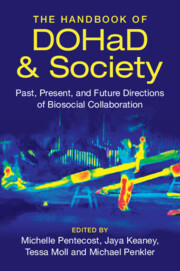The Handbook of DOHaD and Society
Research in the field of the Developmental Origins of Health and Disease (DOHaD) has had a fundamental impact on our understanding of how environmental experiences and contexts influence the development of health and disease over the entire lifecourse. This book provides a comprehensive overview of this research and provides models and tools for the future. Covering a wide range of geographic regions, this volume includes an overview of the field, key concepts, and cutting-edge examples of interdisciplinary collaboration. The first reference text covering the interdisciplinary work of DOHaD, this book has a broad list of contents: it maps the history of DOHaD, showcases examples of biosocial collaboration in action, offers a conceptual toolkit for interdisciplinary research, and maps future directions for the field. This definitive volume on biosocial collaborations in DOHaD will be indispensable for scholars working at the intersections of public health, lifecourse epidemiology, and the social science of DOHaD. This title is also available as Open Access on Cambridge Core.
Michelle Pentecost is a physician-anthropologist based in the Department of Global Health and Social Medicine at King’s College London and in the School of Clinical Medicine at the University of the Witwatersrand. She is the author of The Politics of Potential: Global Health and Gendered Futures in South Africa (Rutgers University Press, 2024).
Jaya Keaney is a lecturer in Gender Studies at the University of Melbourne. Her work in feminist science studies explores how reproduction is shaped by technoscientific practices and regimes of race, gender, sexuality, and coloniality. She is the author of Making Gaybies: Queer Reproduction and Multiracial Feeling (Duke University Press, 2023).
Tessa Moll is a medical anthropologist in South Africa. Her work explores the possibilities of life-making and life-sustaining that arise from new technologies and new knowledges of reproduction. She is currently completing her first solo-authored monograph on reproductive politics, fertility care, and race in the afterlife of apartheid.
Michael Penkler is a medical sociologist and science and technology studies scholar based at the University of Applied Sciences Wiener Neustadt, Austria. His work explores the social, ethical, and political aspects and implications of life science innovations, biomedical technologies, and healthcare.

